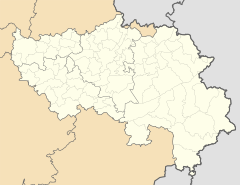Huy (Belgium)
| Huy | ||
|---|---|---|

|

|
|
|
|
||
| State : |
|
|
| Region : | Wallonia | |
| Province : | Liege | |
| District : | Huy | |
| Coordinates : | 50 ° 31 ' N , 5 ° 14' E | |
| Area : | 47.74 km² | |
| Residents: | 21,227 (Jan 1, 2019) | |
| Population density: | 445 inhabitants per km² | |
| Post Code: | 4500 | |
| Prefix: | 085 | |
| Mayor: | Alexis Housiaux ( PS ) | |
Local government address : |
Grand Place 1 4500 Huy |
|
| Website: | www.huy.be | |
Huy (Walloon Hu , Dutch Hoei ) is a town in the province of Liège in the region Wallonia in Belgium . It is the seat of the Huy district with an area of 659 km² and 21,227 inhabitants (as of January 1, 2019).
geography
Huy is located about 30 km southwest of Liège and belongs to the Euregio Meuse-Rhine . The population is 20,295 (48.57% male and 51.43% female; status: 2008), the area 47.64 km².
history
The first written mention comes from the year 636. In the Middle Ages the city was a trading center and a place for wool processing.
The city was besieged during the Palatinate War of Succession from September 18 to 26, 1694 and finally captured. During the War of the Spanish Succession , the fortress was besieged from August 15 to August 26, 1703. The defenders were able to hold off a storm on August 25, but their losses were so great that they capitulated on August 26.
During the occupation of Belgium in World War II , the Huy Citadel served as an internment camp for the German occupiers. From June 1941 to September 1944, around 6,000 Belgians (mostly resistance fighters, opposition members, politicians, Jews, hostages and peasants who had resisted seizure), 1,240 French and several foreign civilians were held captive in the citadel, interrogated and from here in Deported to the National Socialist concentration camp.
The citadel complex, which has been a listed building since 1976, houses the "Museum of Resistance and Concentration Camps", which was opened in 1992 on the initiative of the "Association of Young Belgians to Commemorate the Two World Wars".
Attractions
- Li Bassinia: 15th century fountain in the Grand Place
- Citadel of Huy: the "Museum of Resistance and Concentration Camps" has been housed in the citadel since 1992
- Collégiale Notre-Dame: Gothic church from the 14th century
- Fortress : from 1818, on the right bank of the Meuse
- Town hall: from 1766
Sports events
- Fleche Wallonne : Huy with the final climb of the Mur de Huy since 1986 destination of the famous cycling race Fleche Wallonne, which until 2007 by 2005 UCI ProTour owned and since 2011 part of the UCI World Tour is
- Tour de France : Huy was the starting point for several stages: 1995 , 2001 and 2006 . In 2015 the city was the destination of a stage.
- Rallye du Condroz: Huy is the contact point of the car rally 'Rallye du Condroz'
traffic
- Rail: Huy is on the Liège - Namur railway line and is a station for IR and Intercity trains.
- Bus: The city also has some regional bus routes operated by TEC , including to Liège.
Established businesses
The Tihange district is the location of the Tihange nuclear power plant . Together with the Doel nuclear power plant in Flanders , 58 percent of Belgium's electrical energy is generated there.
Town twinning
|
Sister cities of Huy are |
Friendship contracts exist with
|
Personalities
sons and daughters of the town
- Godefroy von Huy (around 1100 to around 1173), Maasland goldsmith
- Reiner von Huy († around 1150), Meuse goldsmith and bronze caster
- Jutta von Huy (1158–1228), benefactress, Christian mystic and Roman Catholic blessed
- Martin Peudargent (* 1510; † between 1589 and 1594), composer of the 16th century
- Baron Arnold de Ville (1653–1722), Walloon engineer in the service of King Louis XIV.
- Jean-Joseph Merlin (1735–1803), Belgian designer and inventor
- Eugène Guillaume Alexis von Mercy-Argenteau (1743–1819), Austrian military master craftsman
- Joseph Lebeau (1794–1865), Belgian liberal politician
- Emile Delperée (1850–1896), genre and history painter and art educator
- Alfred Pfaff (1872–1954), German industrialist, politician and NSDAP regional economic advisor
- Henri Grégoire (1881–1964), Belgian historian and Byzantinist
- Emile Joseph Labarre (1883–1965), British linguist, paper historian and watermark researcher
- Gustave Charlier (1885–1959), Belgian Romance studies and literary scholar
- Maurice Tillieux (1921–1978), Belgian comic artist and co-founder of the École Marcinelle
- Anne-Marie Lizin (1949–2015), Belgian socialist politician and women's rights activist
- Jean-Pierre Catoul (1963-2001), Belgian jazz musician
- Hervé Jamar (* 1965), Belgian lawyer and politician
- Sabine Laruelle (* 1965), Belgian politician
- Éric Legnini (* 1970), French jazz musician
- Axel Lawarée (* 1973), Belgian football player
- Roberto Bellarosa (* 1994), Belgian pop singer
People related to the city
- Lambert Chaumont (1645–1712), Belgian clergyman, composer and organist, died in Huy
literature
- Vera Beck: Belgium. 3. Edition. Baedeker, Stuttgart 1998, ISBN 3-87504-417-7 , pp. 258-261
- Andreas Pflock: On forgotten tracks. A guide to memorials in the Netherlands, Belgium and Luxembourg. Federal Agency for Civic Education, Bonn 2006, ISBN 3-89331-685-X .
Web links
Individual evidence
- ↑ Illustration by Frans Hogenberg from 1595: Die Stat and Schloss Hoy in the Lüttgerlande ( digitized version )
- ↑ Illustration by Frans Hogenberg from 1595: The Bisschoff now auff Huy, six thousand people brought back ... ( digitized version )
- ^ Official website of Huy


